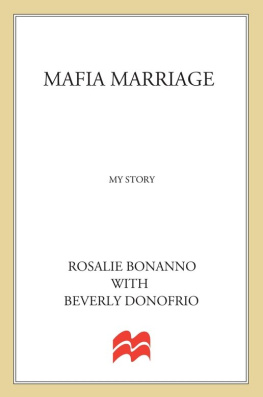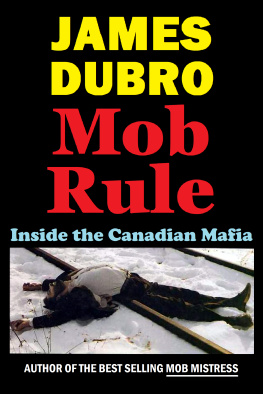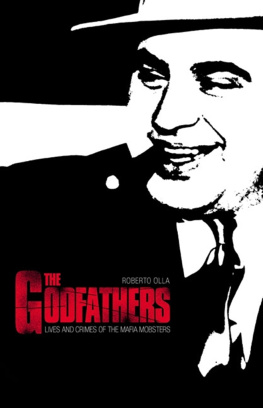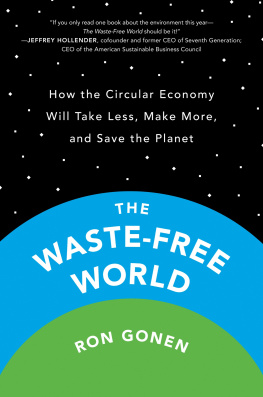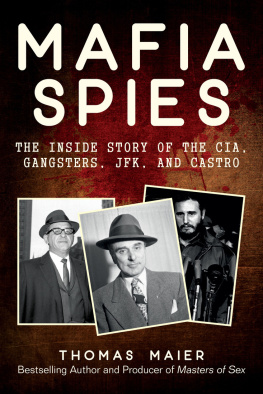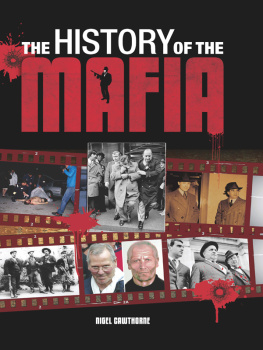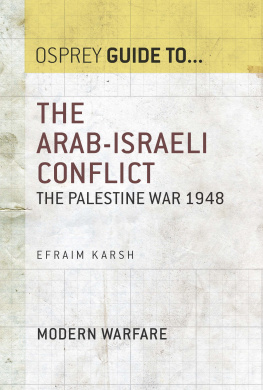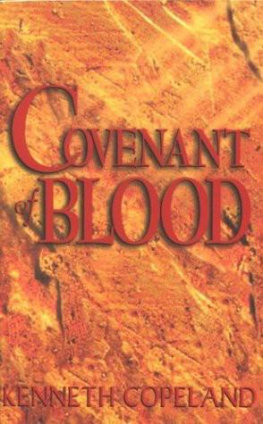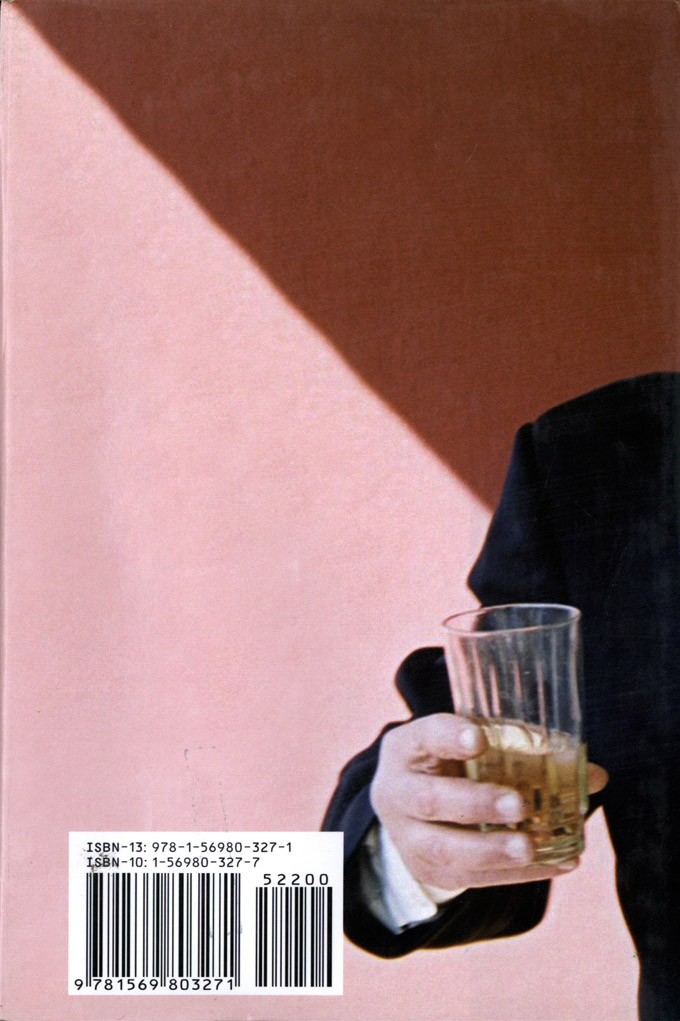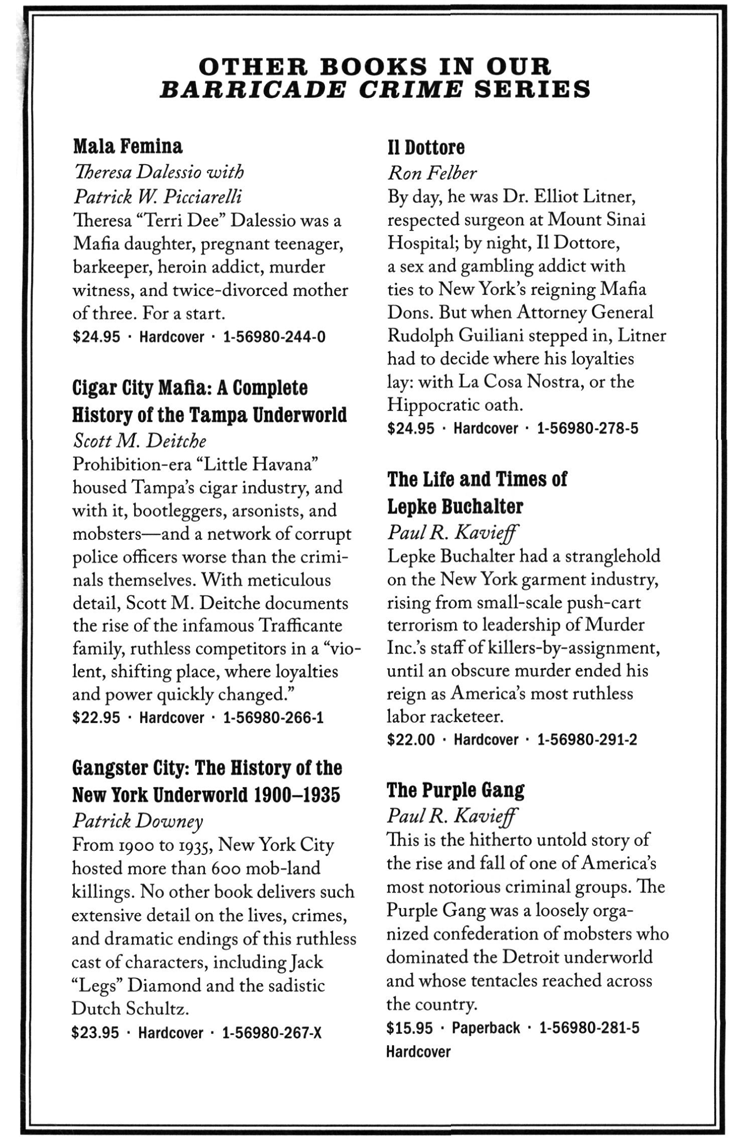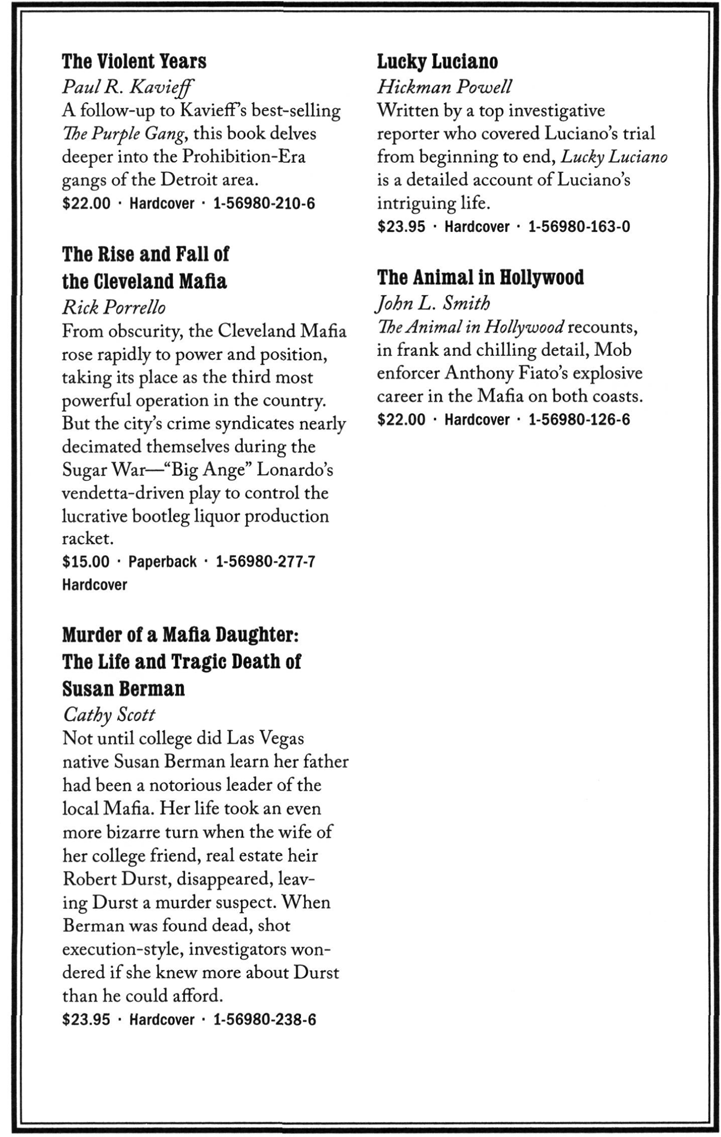ACKNOWLEDGMENTS
R ON GONEN, HONEY Tesman, and their daughter Mariel opened up their lives to me, and without their help, this book would not have been possible. Ron spent countless hours helping me figure out the correct spellings of names, establish a timeline, track down documents, and piece together the events that largely took place when I was still in high school. More important, he spoke candidly and honestly on subjects and events he was plainly embarrassed about and remorseful of having been a part of, knowing they would be included in this book and expose him to the judgment of readers. Such honesty takes an incredible amount of courage, and, were the roles reversed, I'm certain I would not have been able to do it as gracefully as Ron did.
John Guslavage of the Group 63 Task Force and Eric Seidel, formerly of the Brooklyn district attorney's office, were also crucial in helping to make this book an accurate portrayal of the Israeli Mafia. Guslavage helped me confirm Gonen's depiction of events, and Seidel, now with the Manhattan district attorney's office, made thousands of documents, photographs, and transcripts available to me.
At Barricade Books, publisher Carole Stewart saw the importance of this story and gave me a chance to tell it when other publishers said no. I am proud to be among the talented, gutsy, and sometimes controversial authors who call Barricade home. Ivy McFadden provided the much-needed hand-holding and support that every first-time author craves and frequently amazed me in her ability to help me get my act in order and put this thing together.
Much of the work on Blood & Volume was conducted as part of my degree requirements in Goucher College's master of fine arts in creative nonfiction writing programa truly incredible experience I recommend wholeheartedly to anyone who has a passion for nonfiction writing in its many forms. Pete Earleya tremendous journalist I hope to model my career aftertaught me how to navigate the murky waters of professional publishing. Pete not only helped me frame this story, but he also made it stronger with his thoughtful critiques and his endless list of suggestions on ways to report it. I cannot envision a better mentor or friend.
Also at Goucher College, Patsy Sims, Suzannah Lessard, Philip Gerard, and Tom Frenchall incredible nonfiction writers in their own rightdedicated their time and wisdom to make me a better writer. All of them had a hand in guiding this project from idea to finished book, and this would not have been possible without their help.
Christine Dellamonaca, college roommates Michael Rodriguez and Frank Mullen, summer camp pal Noah Bullock, and Ilan Greenberg of the New York Times Magazine all took on the thankless task of volunteering to read my rough copy as I took this book through a string of drafts. Their thoughts, comments, and input were invaluable.
Outside of the writing processbut still a direct and important part of this projectare my friends and family. Unfortunately space prohibits me from mentioning everyone who offered encouragement and advice, but it would be criminal not to mention the following people:
My biggest regret of the whole process is that my father did not live long enough to see me fulfill my lifelong dream of publishing a book. My Mom and Dad have supported me every step of the way. Growing up, my parents did not pigeonhole my sisters and me into one job or another, but instead gave us the simple instruction to find a career that would make us happy.
Mom and Dad, I'm happy.
My sister Joanne, her husband David, and my niecesSara, Emily, and Catherineopened their home to me on the frequent trips I needed to make to New York and New Jersey to conduct research. They helped me decipher train schedules first thing every morning and made sure a glass of wine or a cup of tea was waiting for me when I returned after a long day of research. Beyond that, they were some of my biggest supporters and believed in this project even when I started to have my own doubts.
Brad Davidson has been my best friend and my biggest promoter for twenty-two years. On the frequent occasions when I would complain about the string of awful newspaper jobs I had during that time, he would simply suggest, "You should quit and write a book." It was simplistic career advice, and for a long time I disregarded it as moronic in its failure to take into account how monumental of a task that can be.
As usual I should have listened to Brad a lot sooner.
Finally good writers need great dogs. Cosmo fits the bill and was the necessary distraction I needed when I had spent far too many hours in front of a computer.
Dave Copeland
Boston, Massachusetts
August 2006
Portrait of a Gangster as a Young Hood
T HERE WERE THREE of them, and they met every few weeks in a dingy Los Angeles motel room. It was 1982. In a sense they were to cocaine dealing what other men their age were to the emerging computer industryinnovators, taking what had been a niche industry with expensive products and carving out a mass market. Both were risky business ventures, but both had the potential for huge payoffs.
Ron Gonen was always the guest at these meetings. He was there to meet his old friend, Ran Ephraim, a fellow Israeli and, like Gonen, a lifelong criminal. Ran Ephraim had spent most of the previous year in Peru and Colombia, finding sources for pure cocaine. Once he had found the sourcethe third man, who went by the name of MangoEphraim had set up shop in Los Angeles. It was his motel room, and it was, by all accounts, a sad and lonely place.
Ephraim had found pure cocaine and a supplier willing to fly several kilos of the drug to Los Angeles each month. What he hadn't found were customers. He had no talent for opening up markets. Ephraim was antisocialhe had served in the Israeli military and then had worked as a merchant marine before becoming a full-time criminal in the early 1970s. A big man at 6 feet 2 inches tall and 220 pounds, he wore his hair in a crew cut. In Israel, the other gangsters had called him Blondie, but now in America his hair was getting darker and turning gray. He had a hardened gaze and typically wore combat boots and cargo pants. His presence didn't exactly put potential cocaine customers at ease.
Enter Ron Gonen, his friend from the days in Israel when Ephraim used to fence the jewelry and collectibles Gonen had boosted from hotel rooms and parked cars. Gonen's problem was the oppositehe was trying to sell cocaine in Tel Aviv nightclubs, but his supply route meant a trip to Amsterdam every week to buy low-quality cocaine by the gram from street dealers. Gonen was charming and genuinely liked by most everyone he methe had solid, good looks and an athletic build similar to Ephraim's. He was going bald, but he offset that one deficiency with a gregarious smile.
Before meeting Ephraim and Mango in Los Angeles for the first time, Gonen had been in America only once before. He spent ten days in New York City in December 1981 after fleeing Guatemala on an emergency visa as a civil war erupted in the country. During those ten days, Gonen became a fixture at the famed Chelsea Hotel, which billed itself as "a rest stop for rare individuals"; it had been home to a host of writers, musicians, and artists of varying degrees of notoriety.


